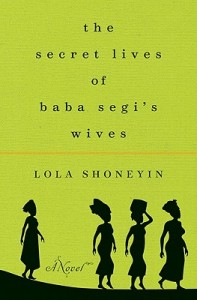“When Baba Segi awoke with a bellyache for the sixth day in a row, he knew it was time to do something drastic about his fourth wife’s childlessness. He was sure the pain wasn’t caused by hunger or trapped gas; it was from the buildup of months and months of worry.”
Here’s today’s reason we should support independent bookstores. Not long ago, I was browsing deep into the shelves of the Porter Square Bookstore, way past the “New Releases!” and “Staff Picks!!” tables, when the spring green binding of The Secret Lives of Baba Segi’s Wives by Lola Shoneyin drew me. I’m not sure I would have found it any other way, so thank you reading karma that led me to Porter Square and Shoneyin’s book that day.
Thank you for that brilliant first line, Lola Shoneyin. (Hello, my name is Randy, and I am a first line junkie.) Pull me in with your lead in and you’ll own me.
Baba Segi had a stable family of three wives and multiple children—then he took a fourth wife. Unlike the others, this new wife is educated and the women are terrified that she’ll change the balance of power in their family.
If families are a delicate balance of personalities, then a multiple-marriage family is spider-web thin and strong, entangling all who enter with strong confusing holds.
Shoneyin, a magical writer, spins her web of story with deceptively simple elegance. Her novel opens the door wider to a reader’s understanding with each chapter. Those who appear to be villains are suddenly revealed as tortured souls. Shoneyin, like all good writers, knows that villains aren’t one-dimensional.
I would shame this book if I gave away a single unfolded secret, so I can only say this: The Secret Lives of Baba Segi’s Wives delves deeply into the weakness of polygamy without showing disrespect towards those women and men raised to live their lives this way. By her deft creation of characters who wiggled inside my psyche and heart, I learned about two unknown-to-me cultures (polygamy and Nigeria) from an inside spot.
This, to me, is the beauty of great novels—they present the heart of an ethos, or a new land, in a manner that sweeps you right into the arms of the story. Unlike how a nonfiction, journalistic read about this topic might allow me to be the watcher peeking inside, Shoneyin’s book gave me a place at the dinner table. Like the difference between watching BIG LOVE or watching a documentary on polygamy, connecting with the characters allowed me to drop my judgment long enough to understand how such a system will damage women, but also, how it can appear to give the only opportunity available.
Women’s journey to equality will only come, I think, with examination of the myriad ways we are (world-wide) kept lower in the hierarchy, an examination that must include how and why we participate in our own cultural prisons. I don’t think we can give up hurtful practices in which we participate (why do we slice our wrinkles away?) until we come to terms to what problems the practices seem to solve (why is youth so over-valued?)
This book answered big questions while telling a page-turning story. Deceptively straightforward, with lines that merited re-reading and being turned like jewels to catch the light, The Secret Lives of Baba Segi’s Wives is one of those wonderful books which has brain-building nutrients tucked into the delicious story.
A mark, to me, of a great book, is one where the characters take up permanent residence inside me—characters that became so three-dimensional they are now part of the large family of children, women, and men who are book-family relatives. Lola Shoneyin has given me a passel of new relatives.
(originally published in 2010)
